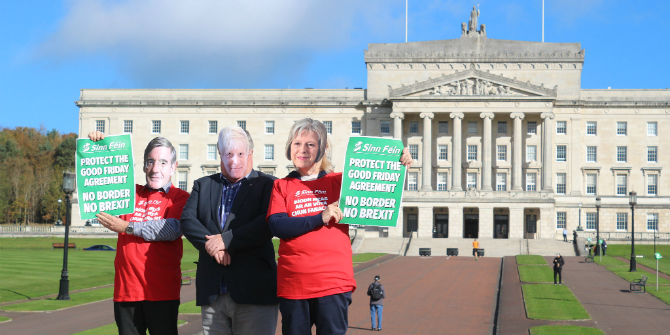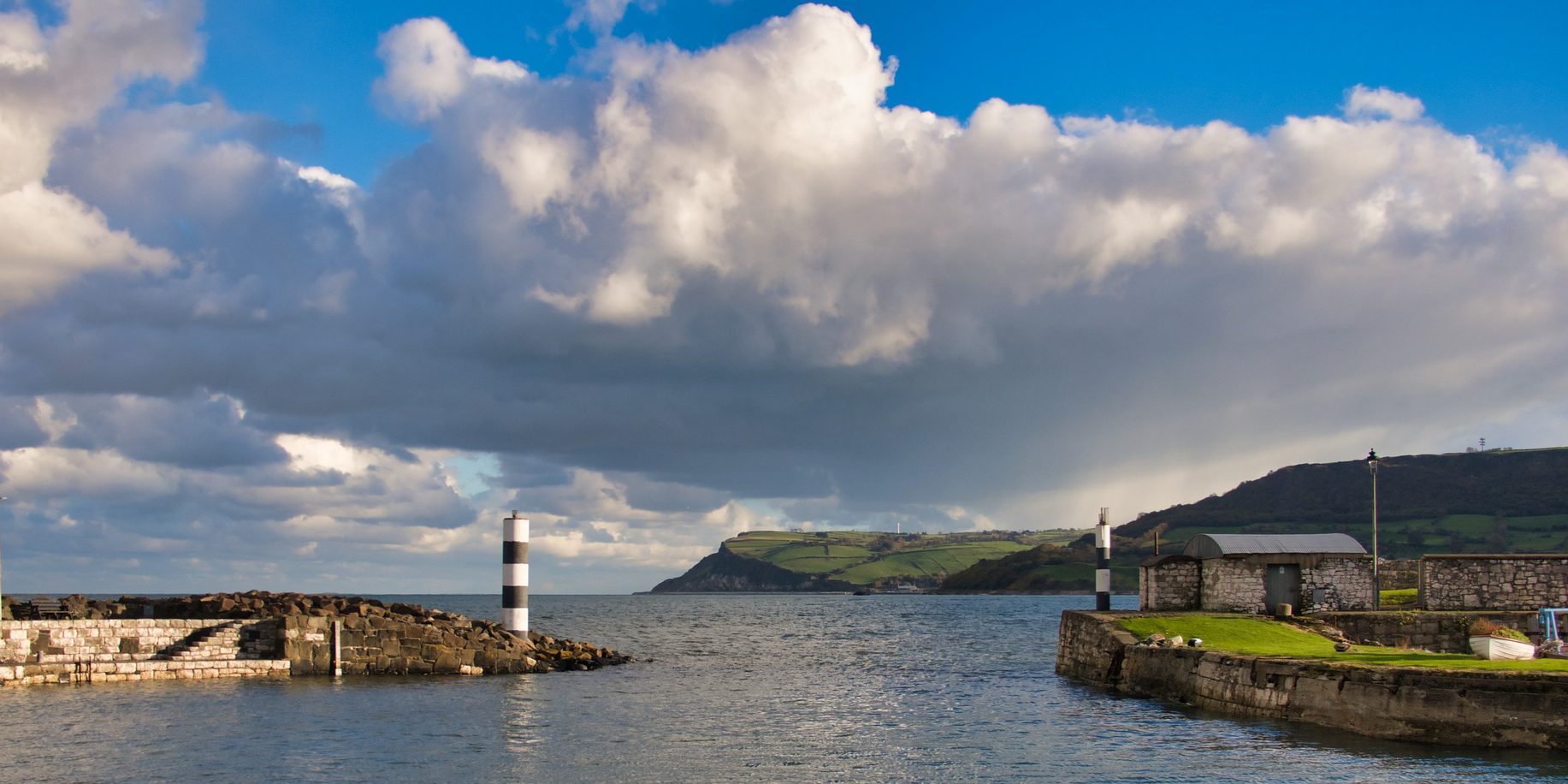In this post, Etain Tannam (Trinity College Dublin) explores the prospects for the Shared Island project, in light of the Brexit process and evolving Irish attitudes to Britishness.
The taoiseach Micheál Martin formally launched the Shared Island initiative on October 22nd, backed by a new unit in the Department of the Taoiseach. It has received various negative critiques: for some unionists, the Shared Island initiative contains no new ideas and/or it is a means to a united Ireland by stealth. For some nationalists and unionists, it is solely motivated by the Fianna Fáil’s electoral aim of undermining support for Sinn Féin, following that party’s success in the 2020 Irish General Election. For some nationalists by emphasising reconciliation not unification, it is a sell-out. However contrary to all these claims, the taoiseach’s speech highlighted just how fundamental is the new initiative.
The key significance is not just about practical policy, but identity – a self-critical reappraisal of who we are on the island and what futures we seek post-Brexit. A core point in the Taoiseach’s speech was the need to examine ‘what does it mean to have British or Irish identity on the island today? Of particular note and not stated before by any Irish leader he stated that he ‘would also like to see more reflection and engagement in the South, so that we look at preconceptions, mutual understandings, challenges and opportunities for our shared future on the island’. He called for probing of ‘some of the simplistic narratives about what we have all come through, which have emerged on both sides of the border’.
Arguably, self-reflection in Ireland on the Irish narrative of history, of unionism, of Britishness and of England is long over-due. A fraught and often tragic history under British rule, but also after it, has led to a tendency among some media commentators and public to have a preoccupation with distant history leading to a labelling of the UK, and, as the taoiseach pointed out, a weakness in objective historical analysis. Brexit has, of course, provided easy fodder for such labelling.

There are no public opinion polls on Irish attitudes to the UK and no systematic content analysis of media narratives, but Brexit seems to have exposed and heightened latent prejudices. In 2019, a public row and bitter rhetoric that followed the Irish government’s announcement to commemorate those Royal Irish Constabulary men who died during the Irish War of Independence showed how historic tensions had not vanished and the event was cancelled. The RIC comprised the Black and Tan recruits from England remembered still in Ireland as exceptionally ruthless, but it also comprised Irish recruits. The Black and Tans were primarily 1st World War veterans and often deeply traumatised themselves. The government hoped to remember all the dead from both sides. While the then Taoiseach, Leo Vardakar argued that ‘we should be mature enough as a State to acknowledge all aspects of our past’, other Ministers said that the RIC was a part of Ireland’s former colonial past and should not be remembered.
In addition, commentaries of the Brexit saga were at times reported in a triumphalist manner. Frequently Brexit was explained completely by English, or British imperialist hangovers (not for example by socioeconomic inequality as argued by Labour MP Hillary Benn). Many commentators often made large generalisations and failed to acknowledge that nearly half the UK population voted to remain in the EU. One journalist in the Irish Times called for ‘British’ self-reflection on identity and stated that: ‘…The British have been gaslighting each other and themselves for generations. This is the personal propaganda cycle that colonialism instigates’. She continued ‘when was the UK respected around the world, beyond superficial Anglophilia, which is – red flag – primarily an American pursuit?’.
Negative portrayals of the UK or England often coincide with a contrast of Ireland’s modernity and success. Brexit combined with Irish liberalisation and growth of confidence has, according to the above commentator in an earlier article, contributed to increased anti-British sentiment: ‘This is the first modern Irish generation that is unselfconsciously patriotic, embracing a benign yet passionate cultural nationalism that is non-sectarian’.
In the New York Times another Irish journalist in an article entitled ’I Didn’t Hate the English – Until Now’ states: ‘In the midst of all this, I’ve noticed a tonal shift in the way I and other Irish people speak about the English. Our anger is more sincere. We are more ready to call them out on all those centuries of excess, more likely to object to those…pink-faced dinasours who still perceive us as their inferiors’.
These examples are not to imply at all that there is rampant anti-Britishness in Ireland. The visit of Queen Elizabeth to Ireland in 2011, the first official visit of a British monarch in 100 years met with a deeply warm welcome. Moreover, other commentators provide balanced portraits. For example, one seasoned Irish Times journalist argued that: ‘Sneering at the foolishness of the British people and taking pleasure at the political contortions required of Theresa May and her ministers to make the best of a bad lot is not simply unneighbourly but potentially dangerous. It is the mirror image of the attitude of those in the UK who demonised the EU for so long’.
In addition, despite the immense strain caused by Brexit and its highly negative impact on Ireland, Irish politicians have been careful to avoid anti-British rhetoric. For example, in an impressive and reflective interview on BBC Radio 4, Simon Coveney, the Minister for Foreign Affairs emphasised the close cultural and family ties between Ireland and the UK, including his own personal ties.
However, the apparent increased incidence of negative stereotyping, apparent unawareness among some that negative labelling of Britishness, just like stereotyping of any ethnic group, is incompatible with a multicultural and tolerant society and that it is clearly noted by unionists, makes Micheál Martin’s emphasis on probing identity in Ireland and understanding different narratives of history all the more crucial. According to Arthur Aughey, ‘for many unionists, an Irish vision of English/British constitutional, cultural, and imaginative backwardness is conjured as the truth of the contemporary UK. It is now the formerly patronising British who have been ‘wrong-footed’ by history’ and the Irish who have the upper hand’. In other words, according to Aughey there is a unionist perception that Irish commentators tend to view Ireland as always on the right side of history and the UK and unionism as always on the wrong side. Thus, for many unionists, reconciliation on the island is hindered by weak self-reflection among some in Ireland and an appearance of smugness towards British citizens.
There is, of course, simplistic reductionism, and negative labelling of Ireland in some unionist quarters in Northern Ireland. Similarly, since Brexit, stereotyping of Ireland has also increased in some English media, for example, personal attacks made on the former Taoiseach Leo Vardakar. However, while there is awareness in Northern Ireland and in Britain of identity issues, in general, there appears to be less awareness in Ireland that it too has not yet left identity politics behind.
The Shared Island launch was followed the next day by the former DUP leader Peter Robinson’s proposal to establish a think tank on the future of the Union. Paradoxically, the two initiatives may well complement each other in the future. Robinson, quoting Arlene Foster, calls for unionists to ‘make the Union more appealing to everyone in our society’. Although rooted in different ideologies, both initiatives potentially mark a watershed in the development of nationalism and unionism on the island by ceasing to view the future through ‘the prism’ of the past.
It is early days, but Micheál Martin in emphasising the need for self-reflection on identity and history on both sides of the border, not just as a ‘Northern Irish’ issue, has launched a brave initiative that hopefully will achieve positive relations in the post-Brexit decades to come.
This article gives the views of the author, and not the position of LSE Brexit, nor of the London School of Economics.







Dublin’s initiative is nothing but a cynical attempt to coerce unionists into the Irish Republic’s political sphere, there will be no discussion about Republican Terrorism, no meaningful dialogue about the ethnic cleansing of Protestants from Londonderry and the broader border counties – after all this is mainly about protecting Fianna Fail’s flank from Sinn Fein – IRA. It is merely a convenient vehicle to denigrate the union and to stamp the Dublin governments authority on Northern Ireland. Watch out for a demand that all road signs are in the Irish language (above the so called English translation), forced Irish language classes for everyone. The money such as it is will be dedicated to promoting values and ideas that originate in places like Clare and Kerry, unionism’s unique Scot’s – Irish heritage and anything Anglo will be quietly swept aside in some sort of Darby O’Gill fantasy. This is the declaration of a culture war to which unionism must respond, leading us yet again down a path of internecine antagonism.
It’s unfortunate that you see matters in this way; I’m a 60 year “republican” (small ‘r’) in the South who lived through the Troubles and some personal losses as a result of the terrorism (that we both, I imagine, abhor).I genuinely want to ‘share’ the island on a communal, friendly, reciprocal basis – I don’t care much what legal formula this observes, republic, federal, close cooperation, existing GFA+ – as long as there’s no killing. No forcing, not Irish language or Scots or any other tradition – just as long as we fulfil the potential of our polity. And that can’t happen under the present tensions. We NEED to agree how to share the island and any step (even from FF) is worth exploring. The Darby O’Gill quip is beneath you. There is nothing in the majority in the Republic which would seek to deny an identity which can be both Irish and British anymore than Welsh and British; we have matured and evolved, time for unionism to do the same.
It is untrue to say that anti-British sentiment is not rampant in the Irish Republic. Speaking from the position of an Ulster Unionist living in Dublin, sneering racist anti-British rhetoric is so ingrained in day-to-day speech that almost no one in Ireland recognizes it as such. Its like living in 1950’s Britain, generation after generation is taught to hate. It is even a central theme in their national anthem.
A very thoughtful and timely article, thank you.
Perhaps as academics, we should use the period of online learning to encourage the reflection on identity by bringing our students together to share their understandings of Irishness, Englishness etc.
This is a very interesting and reflective piece, prompted by Martin’s imaginative initiative. It takes me back to the heady days of 1965 (https://www.irishtimes.com/news/excitement-of-the-first-lemass-and-o-neill-meeting-captured-1.18216).
The problem, as ever, is history. In this case, it’s recent history that is the problem. We in Britain got the impression that Kenny saw Brexit’s ramifications for the border as a problem to be solved jointly. Varadkar and Coveney took a very different view – especially after Dec 2017, when Donald Tusk went out of his way to present the Irish with a blank cheque. The Varadkar/Coveney view was that Brexit was a problem created by the British, so it was up to the British to solve it. The Irish were there to mark the British homework. To no one’s great surprise, the solutions proffered by the British were never quite good enough.
In the process, the Irish tore up two decades’ worth of painfully accumulated Anglo-Irish goodwill. In effect, the Irish burnt their boats with the British, in the expectation of plaudits from Paris, Berlin and Brussels. Was that really wise? Only time will tell. I suppose tax harmonisation will be the acid test.
As Stephen Best makes clear, that lack of goodwill will mean that anything emanating from Dublin, however well intentioned, will be viewed with suspicion and scepticism in Northern Ireland and the rest of the UK. Moreover, has anyone in Dublin noted the muted opposition to the British Internal Market Bill (https://www.instituteforgovernment.org.uk/blog/internal-market-bill-breaks-international-law)? With a few exceptions, the vocal opponents are the ‘usual suspects’ who were routed in last December’s election. No one much cares what the impact will be on the Irish. Not any more.
The Shared Island initiative is a ststement of strategic intent and cannot be reduced to FF opportunism to clip the wings of SF. Micheal Martin. He has been steadfast in rejecting any notions of collaboration with SF during coalition negotiations, despite voices to the contrary from within his own party. He also traveled to Enniskillen to attend the Remembrance Day Celebrations last week. As a retired Irish academic and UK resident, I note two significant changes that have taken place. One, is the continuation of the Common Travel Agreement between GB and Ireland and the exemption of Irish citizens to register, unlike other EU citizens. The second aspect is the perception of public irrelevance of the impact of a no-deal Brexit on the whole of Ireland in the popular press and strands of imperialist thinking being articulated in right-leaning media outlets. In this respect the Spectator stands out, for attracting a public condemnation of anti-Irish bias by the Irish Ambassador of a Hardman article portraying Veradkar as a fool (in typical Trumpian style) and Irish foreign policy as irrational in joining the French Francophonie in preference to the British Commonwealth. I personally lodged a formal complaint to the Press Complaints body, IPSO, on the same article .Even at family level, Brexit can cause a major divide on differing Irish/British perceptions of integration and alienation. The Shared Island concept also applies in its own way to GB.